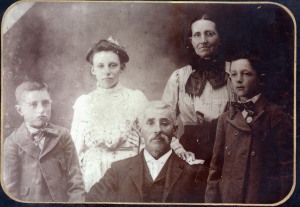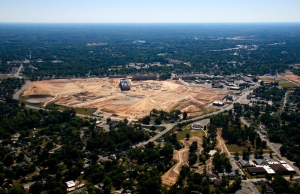The North Carolina State University Libraries’ Special Collection Research Center (SCRC) has been documenting changes occurring in Kannapolis as our city moves from an industrial economy to a biotech economy. This evolution was preceded by Kannapolis transitioning from an agricultural economy to an industrial economy. Many of our area’s early residents made a living by farming. But when J.W. Cannon chose farm land in Kannapolis to become the site of his model mill town, many of the farmers moved from a tiller to a loom.
Paul Dayvault, seated, sold 72 acres of farmland he used to grow corn and cotton to J.W. as part of the 1008 acres purchased in total to build his mill village. Dayvault’s son Dolph, far left, later worked for Cannon Mills Company as a sewing machine fixer.
Fast forward to February 1982. Long after J.W. Cannon built the mill and son Charles led the mill into great financial success and world acclaim, it was sold to David H. Murdock, sole owner of Pacific Holding Corporation. In December of 1985, Mr. Murdock sold the mill to Fieldcrest, an Eden, NC based textile firm. Then in September of 1997, Pillowtex Corporation of Dallas, TX purchased the mill. The largest layoff in North Carolina history occurred in 2003 in our city when Pillowtex permanently closed its doors, leaving 6,450 workers without a job. The mill had been in operation for more than 115 years.
On September 12, 2005 David H. Murdock, Dole Foods and Castle and Cooke CEO, announced a most ambitious plan for the Cannon Mills site that he purchased for the second time in 2004. The idea to transform the mill site into a unique college campus where scientist would come from around the world to study human nutrition was formulated. But rather than the traditional notion of a campus housing only one university, the idea began to take shape of a campus that would house multiple universities with a core lab at its heart. “We will be the largest single scientific research area anywhere,” explained Murdock.
And this is the unique story that the North Carolina State University Libraries’ Special Collection Research Center is working diligently to preserve. The NC Research Campus Archives captures this transformation with tools such oral histories, photographs and press releases.
North Carolina State University and the North Carolina Research Campus are sponsoring a lecture series that dovetails nicely with this archival collection. The D. H. Hill Library at NC State University has planned The New New South Lectures. Mark your calendar for February 23 at 6 pm when Dr. Steven Leath, vice president for research, UNC system, presents the first lecture of the series in the David H. Murdock Core Laboratory. Partnering Transformation: Challenges of a Public/Private Partnership will be of great interest to everyone involved with the campus and our community.
North Carolina Workers and the Industrial South will be presented on March 4 at 4pm by Dr. David Zonderman, professor of labor history, NC State. This lecture will take place at NC State’s D.H. Hill Library.
Rising to the Research Challenge of the Twenty-first Century: The New Workforce (Panel Discussion) with Dr. Tom Miller, vice provost, distance education and learning technology applications, NC State; Donnie Goins, COO and president of Tavve Software Company; and Dr. Larry Monteith, chancellor emeritus, NC State, will be offered two times. On March 25 at 4pm, this discussion will take place at the D. H. Hill Library at NC State University and then again at the North Carolina Research Campus on April 8 at 6pm.
Communities in Transition will be presented Dr. Michael Walden, professor and extension agricultural and resource economist specialist, NC State University, at the D.H. Hill Library at NC State University, April 15, at 4pm.
For more information about the collection or the lecture series, contact Genya O’Gara, genya_ogara@ncsu.edu.
Filed under: Uncategorized | Tagged: heritage, historic preservation, history |




Leave a comment